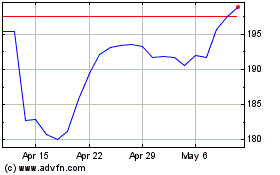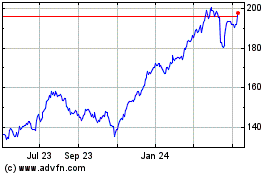Final Impact Disclosure Guidance Released, Aimed to Scale Financing for the UN Sustainable Development Goals
October 23 2024 - 3:00AM
Business Wire
Market-led initiative could drive more capital
to investments that advance sustainable development in places with
the greatest need
The Impact Disclosure Taskforce, a market-led effort co-chaired
by J.P. Morgan and Natixis Corporate & Investment Banking,
released its final voluntary Impact Disclosure Guidance,
following a public consultation period. The Impact Disclosure
Guidance helps corporate and sovereign entities provide
transparency on their efforts to reduce poverty and inequality in
communities that still lack access to basic human needs. It also
helps disseminate information to institutional investors that are
seeking investments that offer both financial and social
returns.
Drawing on existing resources, the final guidance outlines a
five-step process for corporate and sovereign entities to measure
and disclose the development impact of their business strategies or
national development plans. The guidance, whilst voluntary, is
applicable to both developed and developing country entities, as a
means to measure their impact on underserved communities at home
and abroad, and to attract impact-focused investors to fund their
efforts. Key aspects of the guidance include:
- Entity-level but context-specific: Assesses the entity’s
overall strategy in countries of focus, measuring how the entity’s
products, services, and operations are anticipated to address the
most acute development gaps in each country;
- Impact-oriented: Focuses on outputs and outcomes,
including plans to achieve outputs and the theory of change assumed
to lead to outcomes; and
- Forward-looking: Establishes targets that measure
intended impacts, as well as a commitment to monitoring and
reporting progress against targets.
With the release of the final guidance, the Impact Disclosure
Taskforce encourages:
- Investment banks and underwriters to highlight and
promote the adoption of the guidance to their corporate and
sovereign clients;
- Institutional investors to review entities adopting the
guidance for allocation from their sustainable or impact
portfolios;
- Data and analytics providers to support investors with
independent verification and analysis of the development impact
disclosures; and
- Regulators to consider interoperability of the guidance
with sustainable finance rules and disclosure regulations.
First convened in April 2023, the Impact Disclosure Taskforce is
a network of more than 80 financial institutions and industry
stakeholders whose objective is to bring more impact transparency
to financial markets. While continuing to expand its network, the
Taskforce remains a resource to stakeholders looking to implement
the voluntary Impact Disclosure Guidance. Additionally, the group
is now working on building market infrastructure to help
disseminate and analyze disclosed impact information.
Gergana Thiel, Global Co-Head of Macro Sales, J.P.
Morgan:
“Institutional investors that prioritize impact in their
investment strategies are more varied and nuanced than traditional
ESG investors. While some investors may seek impact on financial
inclusion, others on water and sanitation, and others on gender
equality; they all require better impact disclosure from entities
issuing securities. This guidance will increase the investment
opportunities across all themes, providing investors more choice to
invest in accordance with their financial and non-financial
criteria.”
John Ploeg and Armelle de Vienne, Co-Heads of ESG Research
for PGIM Fixed Income:
“Historically, ESG disclosures have focused on
financially-material ESG risks/opportunities; however, with some
asset owners increasingly looking to generate positive
environmental and social impacts with their investments, the need
for issuers to take a standardized approach to reporting impacts is
paramount for asset managers to determine appropriateness for these
clients. This guidance strikes a great balance between
standardization and giving issuers the flexibility to report on
what’s most material for them.”
Dan Grandage, Chief Sustainability Officer, Investments,
Abrdn:
“This guidance addresses a neglected global engagement issue and
provides a practical framework for companies to report on positive
impact. Making this data accessible, consistent, and comparable has
aided impact analysis and reporting in emerging market debt,
notoriously an asset class where data access has been substandard
or difficult to access. We hope it will help support the growth of
investments dedicated to contributing to the UN SDGs, an objective
abrdn is committed to via our SDG aligned fund range.”
Cédric Merle Hamon and Leisa Cardoso De Souza, Center
of Expertise and Innovation within Natixis Corporate &
Investment Banking’s Green and Sustainable Hub:
“The guidance is a new toolbox for framing a contribution to the
UN SDGs in a readable way for financiers. It provides a
step-by-step method and will nudge corporates and sovereign
entities to set forward looking targets. It also paves the way for
fruitful engagement on impact delivery and optimization, but also
remediation as it includes negative effects.”
For more information, visit
https://www.icmagroup.org/assets/documents/Sustainable-finance/Impact-Disclosure-Guidance-October-2024-181024.pdf.
View source
version on businesswire.com: https://www.businesswire.com/news/home/20241023147754/en/
Media Contacts: Charlotte Powell, J.P. Morgan,
charlotte.f.powell@jpmorgan.com Ashley Frost, J.P. Morgan,
ashley.c.frost@jpmorgan.com
JP Morgan Chase (NYSE:JPM)
Historical Stock Chart
From Oct 2024 to Nov 2024

JP Morgan Chase (NYSE:JPM)
Historical Stock Chart
From Nov 2023 to Nov 2024
